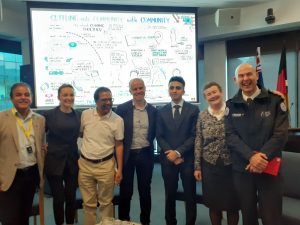New book probes refugee settlement services
 A new book tells the story of refugee Om Dhungel’s journey from a remote village in Bhutan to a human rights activist in Nepal and eventually to his work as a community leader in Blacktown, in Sydney’s west.
A new book tells the story of refugee Om Dhungel’s journey from a remote village in Bhutan to a human rights activist in Nepal and eventually to his work as a community leader in Blacktown, in Sydney’s west.
The book, co-written with journalist James Button, tells how Om was forced to flee his home and leave behind a senior public service job when the Bhutanese government launched an ethnic cleansing campaign targeting citizens of Nepali ancestry in the 1980s.
Om’s story is one of grit and struggle, humour and irrepressible optimism; and of how losing nearly everything shaped his character and fate.
The story also includes an account of his role in helping to settle more than 5,000 Bhutanese refugees in Sydney.
It begins in Bhutan in the late 1980s when almost 100,000 Bhutan citizens of Nepali heritage, or about 17 per cent of the nation’s population, were expelled from the country.
Most ended up in camps in Nepal. From 2007, many of the exiles were relocated to Western nations, such as the US, Canada, the UK and Australia.
Om came to Australia as student and later was grated refugee status. When Bhutanese people began to arrive in Sydney, Om began volunteering to support them.
A panel discussion at a recent ‘Bhutan to Blacktown’ launch event in Melbourne canvassed Australia’s settlement services with Om saying he believed refugee communities should be more formally involved in the delivery of services.
He said there was a need to recognise the importance of the “contextual expertise” that those with lived experience could bring to bear on settlement issues; and that refugee communities could contribute more to positive settlement outcomes through collaboration with service providers.
“Agencies and communities working in settlement should try to find a confluence of interest instead of competitive interests,” Om said.
“The government’s funding models create winners and losers and are disincentives to a collaborative approach which could see providers empower communities to work towards their own settlement outcomes.”
Om spoke of the two kinds of expertise needed for successful settlement.
“There is expertise that is learned at university that relates to government policy and settlement practice. This is content expertise,” he said.
“But there is also context expertise which can be brought to bear by people with lived experience.”
CEO of refugee and migrant settlement agency AMES Australia Cath Scarth told the event that partnerships between community groups and professional service providers were critical to successful settlement.
“It can be difficult for new arrivals or even well-meaning community members to navigate what is a very complex service system in Australia,” Ms Scarth said.
“Every newly arrived person’s journey is different and so are their needs, barriers and aspirations. So, it’s important we have a professional case management system that aims to help everyone find their own pathway to successful settlement.
“Part of that system is to support people to connect first with their own community and then with the broader community.”
AMES Case Manger Liza Maksmychuk, who has been supporting recently arrived refugees from Ukraine, told the event that community efforts to support settlement were powerful and heartfelt but they needed to be backed up by a well-resourced, professional settlement system that ensured no one fell through gaps.
“The service system in Australia is very complex and knowing where to go to get the right support can be difficult. Our settlement teams have built up relationships with service providers over years so that we can quickly and safely get people the support they need,” Ms Maksmychuk said.
“Community support is key and it played a huge role when we saw large numbers of Ukrainian women and children arriving after the Russian invasion. But it cannot replace the specialised professional services from, for example, trauma and torture counselling experts.
“Having said that, I think that everyone can make a difference in successful settlement. After all, it is in all our interests that newcomers find successful lives in Australia and fulfil their potential.”
Former Afghan refugee Jalal Ahmadzai told the event that it was important that refugees were encouraged to find their own pathways and to build on their strengths.
“I think people can sometimes think that refugees are helpless. But many of us are keen to get on with our lives and build careers in Australia, said Mr Ahmadzai, who was part of the exodus from Kabul in September 2021 after the Taliban’s seizure of power,” he said.
Mr Ahmadzai was volunteering within a week of arriving in Australia and had a job within three months.
“A lot of people in the latest Afghan cohort had low expectations of life in Australia. People thought they would be doing menial jobs and would have to start from scratch.
“But the reality is that there are opportunities to study and to resume your career in Australia and many of us have taken advantage of that.
“So, it’s important that a settlement system recognises the strengths, skills and qualifications refugees bring with them and empowers them to achieve their goals.”












